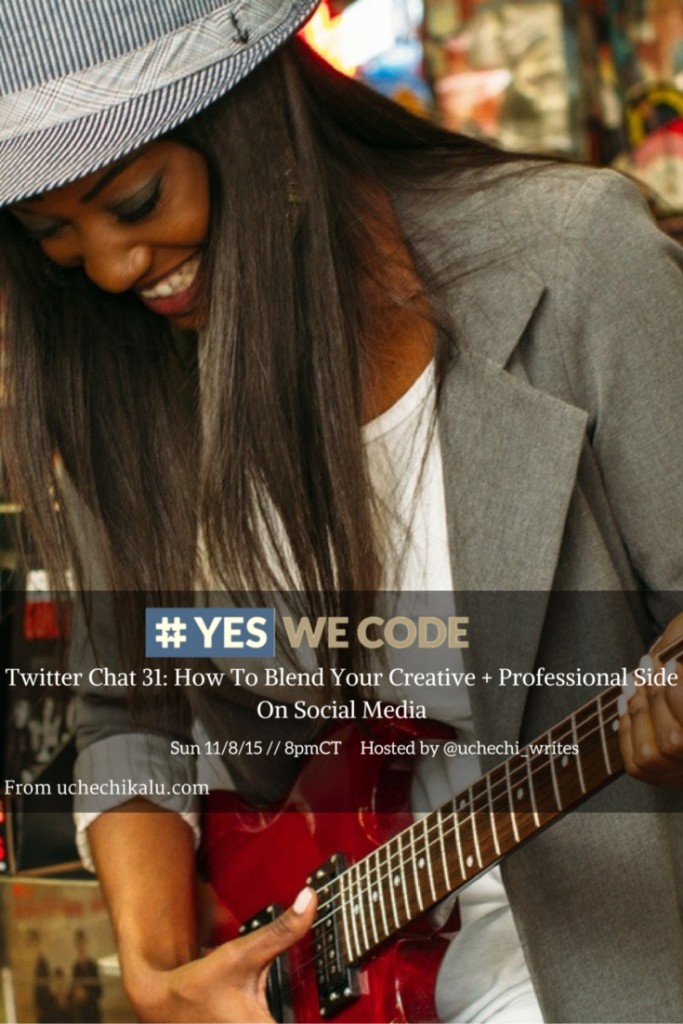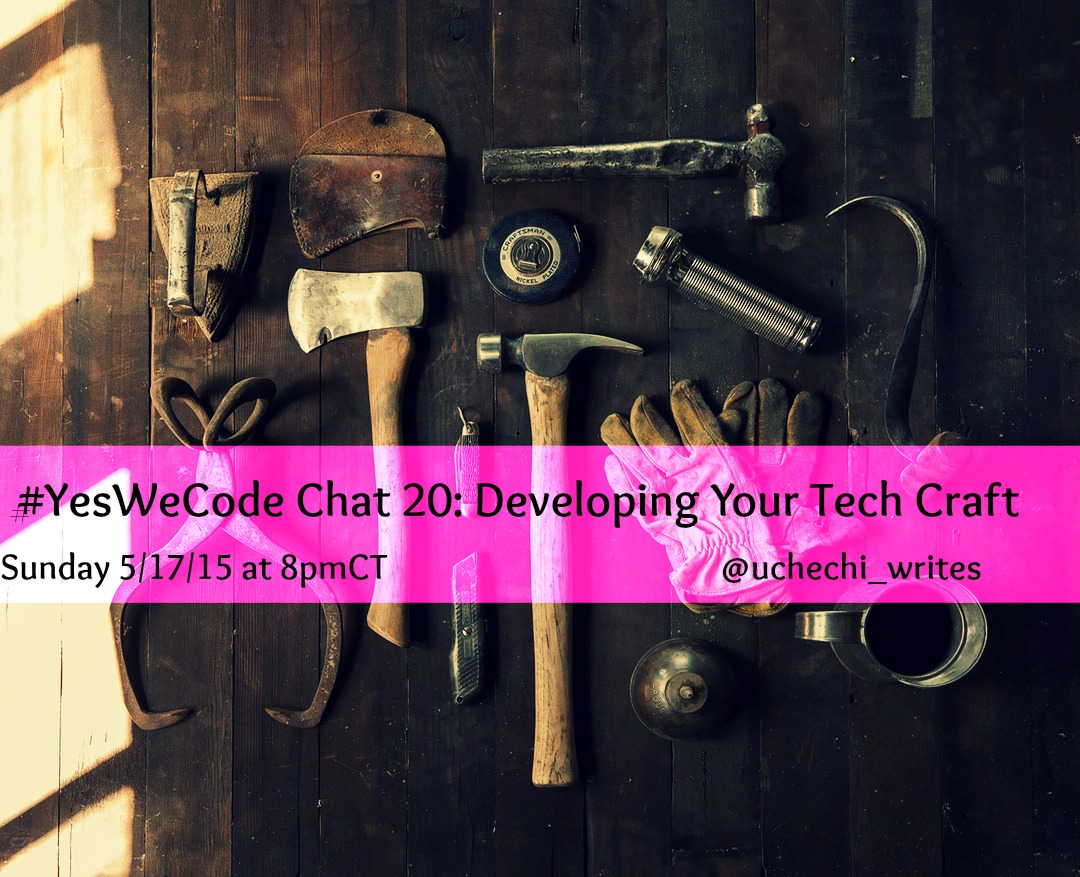
by Uchechi | Nov 5, 2015 | Blog

#YesWeCode Chat 31: How To Share Your Creative & Professional Self on Social Media
Sunday 11/8/15 at 8pmCT
Follow me on Twitter @uchechi_writes
Blending two career paths and/or interests online can be tricky. My husband and I both know several musicians/coders and I constantly see fellow entrepreneurs sharing their creativity on social media. As a poet, startup founder and entrepreneur, I’ve discovered that it has a lot to do with what your goals are on social media. Are you sharing one part of yourself for you career and the other is just fun? Do you want to grow and monetize both selves? Knowing your audience is important, but so is figuring out how you can engage, inform, learn, inspire, educate?
If you’re interested in maximizing what what you get out of social media sharing, while also giving yourself freedom to explore your creativity, this is a chat topic you’ll want to join.
During the next #yeswecode chat, we’ll explore this topic because and I look forward to learning from other entrepreneurs and creatives.
I’ve chosen to focus on doing these things and letting go of the rest. This is you, and it’s an important part of you. People want to share that, especially if they can learn something for their own lives.
Questions To Think About:
1. Should we have to be one dimensional online? We aren’t in real life?
2. How can we bring together all the essential parts of our work?
3. Do we have to create separate social accounts for all the different parts of ourselves?
4. Can we just be “creatives” and what does that even mean?
5. What are ways you’ve integrated the two? What’s worked? What hasn’t worked?
See you there!

by Uchechi | Jun 14, 2015 | Blog, creativity
I didn’t major in CS
I didn’t go to UX design school. I don’t think it even existed when I graduated from college in 2001. While I didn’t know anything about user experience design, I did know that I was interested in human behavior and interactions. User Experience Designers come from all different majors and backgrounds.I thought I’d major in Environmental Science. I loved learning how things worked, especially in the environment.During the spring of my freshman year, I took a poetry class that would eventually lead me to a career in technology.
Poetry Taught Me To Love Creativity and Language
I know this doesn’t sound like a predictable path, but it came out of going for something that ignited my curiosity, and led me to a career I didn’t even know I’d want to pursue.I was lucky to be mentored by the late poet June Jordan. She was one of the most published black writers in US history and I found a resonance in our stories. She encouraged me to express myself, to take risks, to get on stage even when my nerves were fried and my poems were drenched in my own fear. She made it valuable to take risks for something important, which was finding and owning my voice.
It was UX love at first wireframe
Years later, I found myself with a career as a professional poet, teacher and online copywriter. I’d spend weekends performing at conferences, jails, schools and more. What I loved most about this work was that it made me engage with my audience in a way that brought us all closer together. I’d write a range of content and was always aware of the language I used and the emotions conveyed based on the words I chose.I loved how language had an impact and could affect how we felt about anything. I learned to be intentional with my language and to use it wisely to convey exactly what I wanted to say.
User Experience Design Was Similar to Poetry
Online copywriting led me to discover UX, and it was love at first wireframe. Something about User Experience felt familiar.
- I got to have a voice and to use it.
- I could create something that allowed me to engage with my audience of users.
- It allowed me to be intentional about language and to not waste words.
- I had to think about who my audience was, and create experiences they could connect to.
- My platform was no longer a stage, but was now online. The world could connect. The world became my users.
- I could still be very creative and use writing as a tool.
- UX was also all about great copy, and I loved writing great copy to create great experiences. I was in tech heaven.
Want to know how to get into a tech career?
Start with finding your voice
If you’re headed to college, everyone will want to give you advice about what you should major in. You don’t know me and you might not want my advice, so I’ll tell you what I believe instead. I believe true creativity is rooted in any discipline that allows you to find a voice and to believe that your voice matters. Once you find that, you can express it in several ways (poetry, fine art, technology), but you have to trust that your perspective has value.
Suggested Classes To Take (You can do these now, even if you’re not in college anymore):
- Take classes that help you find your voice. Theater and creative writing classes are great for this.
- Take classes that reinforce the idea that mistakes are okay, and sometimes your best way of learning. Art classes are great for this.
- Take classes that encourage you to get up and share your perspective. Often in UX, you end up working in teams and need to be able to explain your ideas to others. Public speaking classes are great for this.
- Do something that allows you to take risks. Reading a poem during open mic night at your local bar is a great way to do this.
- Take classes in Architecture, which allows you to understand structural planning, which will help you in User Experience Design.[“Tweet “Creativity is rooted in the belief that you have a voice and that your voice matters enough to share it with the world.”]
Conclusion:
As a tech entrepreneur, I often get asked how I found this career path. My first response is usually something like this: “No, I didn’t major in CS, but I did study creative writing and education.” I was obsessed with language, perspectives and what it meant to have a voice and to trust that voice. It was trusting that voice that led me to love language enough to pursue a writing career, which led to online copywriting and then to UX. The skills I learned as a poet have also applied to my UX career. If you want to know how to get into tech, my advice is to find your creativity by finding your voice.How did you get into tech? How did you find your way to teI’d love to know your story. Hit me up in the comments!

by Uchechi | May 15, 2015 | Blog
#YesWeCode chat 20: Developing Your Tech Craft
Sunday May 17th, 2015
6pmPST/8pmCT
Historically, the idea of developing and honing ones craft has been left to artists. Painters, writers and sculptors spend their whole lives practicing, evolving and changing how they do things to make their technique better and to serve their artistic creativity.
As a poet and UX Designer, I believe technologists are no different. We’re the modern creatives, and instead of using brushes we’ve got wireframes, Google Fonts and CSS. But, are we improving our technique and changing how we do things to serve our work in tech? Or, are we just focused on getting a few skills down so we can find the next coding, design or blogging gig.
Acknowledging that our creativity in technology is our craft is important because it allows us to see what we do as a life long journey and not just our next destination.
During the next #yeswecode chat, we’ll talk about how to develop your craft into lifelong skills that you can use at any job.
Questions to think about:
- How does your “work” influence industries outside technology?
- When you think about “developing your craft”, what does that mean to you?
- What practices do you have in place to make sure your craft evolves over time?
- What can we learn from how artists develop their craft? How can we apply it to tech?
- Given that the tools, the practices, even the materials of our craft change daily, how can we maintain a center?
- Artists have clear identities, styles. Do we? Should we? If so, in what ways? If not, why not?
- How does your personal identity inform your craft?
See you on Twitter!
New to the #yeswecode chat? Check out the guidelines to help you make the most out of it!



